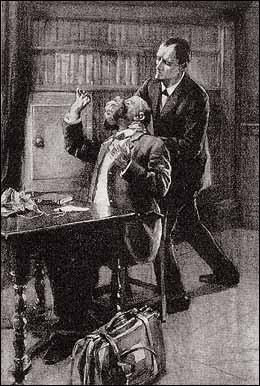An occasional feature about the places in the John H Watson Canon
‘But you, Watson,’ he stopped his work and took his old friend by the shoulders; ‘I’ve hardly seen you in the light yet. How have the years used you? You look the same blithe boy as ever.’
‘I feel twenty years younger, Holmes. I have seldom felt so happy as when I got your wire asking me to meet you at Harwich with the car. But you, Holmes – you have changed very little – save for that horrible goatee.’
‘These are the sacrifices one makes for one’s country, Watson,’ said Holmes, pulling at his little tuft. ‘To-morrow it will be but a dreadful memory. With my hair cut and a few other superficial changes I shall no doubt reappear at Claridge’s to-morrow as I was before this American stunt – I beg your pardon, Watson, my well of English seems to be permanently defiled – before this American job came my way.’
‘His Last Bow: An Epilogue of Sherlock Holmes’

The East coast ports are Dutch. Mellow brick houses have stepped battlements, the prevailing colours are from sand and brick. The old town of Harwich is the best of them, with its narrow streets on the peninsula between the Orwell and the Stour.
From “English Cities and Small Towns” by John Betjeman, A Panorama of Rural England, W.J. Turner, Ed., Chanticleer Press, 1944, p. 130.
Harwich is not just any port. Not only is it the UK’s second busiest passenger ferry port, its harbour, which is the largest between the Humber, in the north of England, and London, was created by a storm surge in the 1100s, a quirk of fate that gave rise to the area’s long and fascinating seafaring history.
From Harwich & Dovercourt, visitessex.com.
In 885 ce Alfred the Great defeated Danish ships in a battle that took place in the harbour. Harwich’s seaborne trade developed steadily, notably in the 14th century, and shipbuilding was a significant industry in the 17th century. The town’s major development, however, awaited the coming of the railway. Harwich became, as an outport of London, a terminus for passenger ferries across the North Sea.
From Harwich, England, United Kingdom, www.britannica.com
Note: I realize the last two quotes about the harbour at Harwich are odd in the contrast in their dates. That is why I chose them. The contradiction in dates and events seems serendipitous when talking about the writings of John H Watson.–Mopsy
